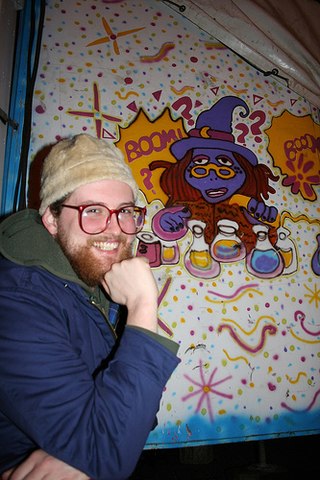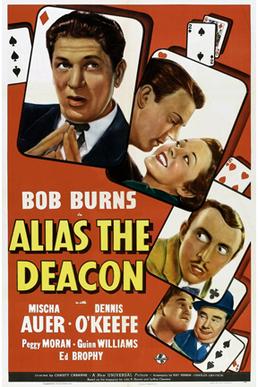Alias the Deacon may refer to:
- Alias the Deacon (1927 film), an American silent drama film
- Alias the Deacon (1940 film), an American comedy film
Alias the Deacon may refer to:
Alias may refer to:
Covenant may refer to:
Coach may refer to:
The Getaway may refer to:

The Pilgrim is a 1923 American silent film made by Charlie Chaplin for the First National Film Company, starring Chaplin and Edna Purviance.
Jagged Edge may refer to:

Daniel Deacon is an American composer and electronic musician based in Baltimore, Maryland.

George Frederick "Wilson" Benge was an English actor who mostly featured in American films from the silent days. He appeared in over 200 films between 1922 and 1955.
Incognito is an English adjective meaning "in disguise", "having taken steps to conceal one's identity".

Edward Sloman was an English silent film director, actor, screenwriter and radio broadcaster. He directed over 100 films and starred in over 30 films as an actor between 1913 and 1938.
Skylar or Skyler is a unisex given name, a variant spelling of Schuyler. It may also refer to:
Taken may refer to:

Alias Jimmy Valentine is a 1928 American crime drama film directed by Jack Conway and starring William Haines, Leila Hyams, Lionel Barrymore, and Karl Dane. The film is based on the 1903 O. Henry story "A Retrieved Reformation", which was turned into the 1910 play Alias Jimmy Valentine by Paul Armstrong. The play toured in travelling production companies making it extremely popular. It was revived on Broadway in 1921. Two previous film adaptations had been produced at the old Metro Studios. A 1915 film version was directed by Maurice Tourneur and a 1920 version starring Bert Lytell was directed by Edmund Mortimer and Arthur Ripley.
Amazon most often refers to:

Alias the Deacon is a 1927 American silent drama film directed by Edward Sloman and starring Jean Hersholt, June Marlowe, and Ralph Graves. It was produced and released by Universal Pictures. Based on a stage play of the same name, it was directed by Edward Sloman and is preserved at the Library of Congress Packard Campus for Audio-Visual Conservation. It was remade as a sound film Alias the Deacon in 1940.
Jimmy Valentine may refer to:

Half a Sinner is a 1934 American pre-Code drama film directed by Kurt Neumann and starring Sally Blane, Joel McCrea and Berton Churchill. It was based on the play Alias the Deacon, which was also the basis of 1927 and 1940 films.
Alias Jimmy Valentine may refer to:

Alias the Deacon is a 1940 American comedy film directed by Christy Cabanne and written by Nat Perrin and Charles Grayson. It is based on the 1925 play The Deacon by John B. Hymer and LeRoy Clemens. The film stars Bob Burns, Mischa Auer, Peggy Moran, Dennis O'Keefe, Edward Brophy, Thurston Hall, Spencer Charters, Jack Carson and Guinn "Big Boy" Williams. The film was released on May 17, 1940, by Universal Pictures.